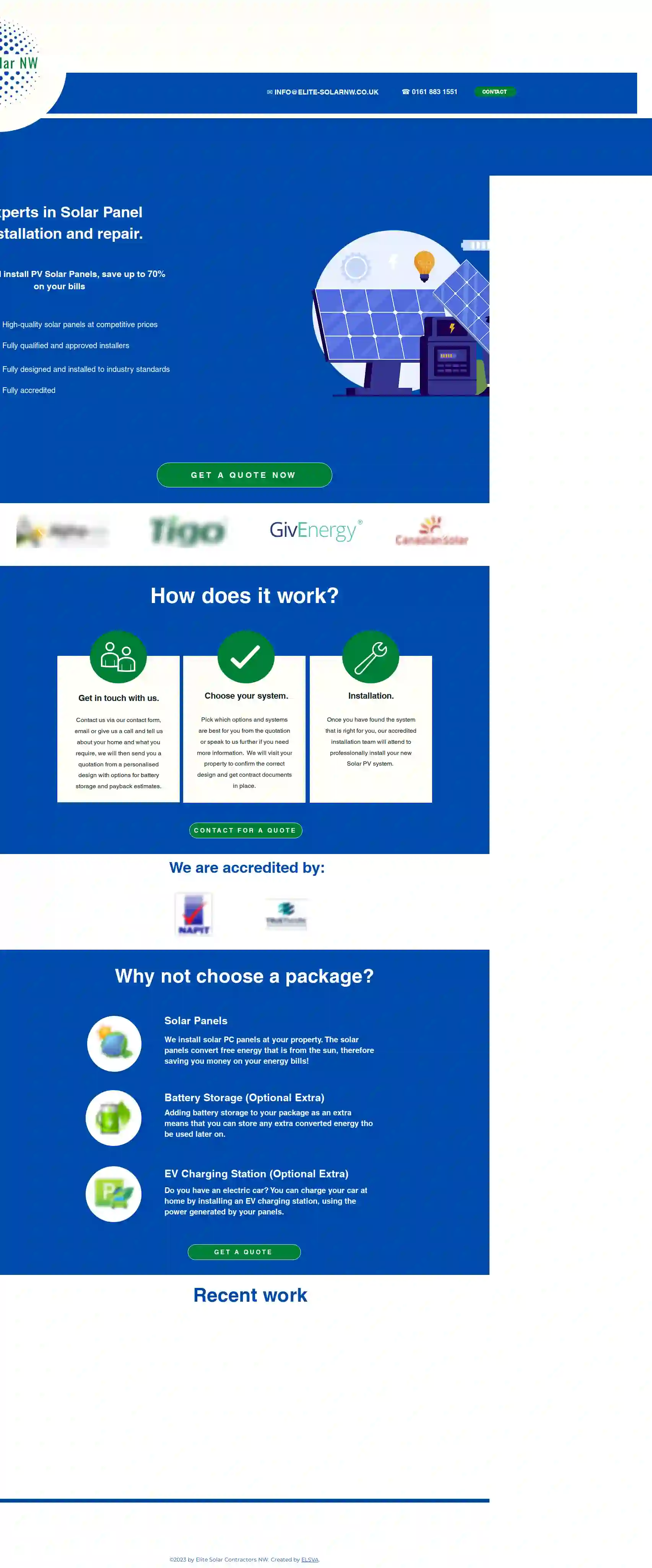Solar Installers Bispham
Find Solar Energy Company in Bispham
Receive multiple Solar Energy Companies quotes for your project today! Compare profiles, reviews, accreditations, portfolio, etc... and choose the best deal.

Elson Solar - Part Of Elson Electrical Ltd
Middle House, Back Lane, Spurstow, Tarporley, CW6 9TE, GBElson Electrical is a family-run business based in Tarporley, Cheshire, offering a comprehensive range of electrical services. With a commitment to quality and customer satisfaction, they have built a reputation for reliability and expertise. As a NAPIT registered electrician, Elson Electrical ensures all work is carried out to the highest industry standards. They are also MCS accredited, demonstrating their expertise in renewable energy solutions, particularly solar PV and battery storage systems. Elson Electrical prides itself on providing tailored solutions to meet the unique needs of each client, whether it's a domestic or commercial project.
- Services
- Why Us?
- Accreditations
- Gallery
Get Quote
Elite Solar Contractors NW
Chorley, GBElite Solar Contractors NW are experts in solar panel installation and repair. We supply and install PV solar panels, helping you save up to 70% on your energy bills. We offer high-quality solar panels at competitive prices, and our fully qualified and approved installers ensure that every system is fully designed and installed to industry standards. We are fully accredited, giving you peace of mind knowing you're in safe hands. How does it work? 1. Get in touch: Contact us via our contact form, email, or give us a call. Tell us about your home and your requirements. We'll then send you a personalised quotation with design options, including battery storage and payback estimates. 2. Choose your system: Select the options and systems that best suit your needs from the quotation. If you need more information, we're happy to discuss it further. 3. Installation: Once you've chosen the right system, our accredited installation team will professionally install your new solar PV system at your property. Why not choose a package? We offer a range of packages to meet your needs: Solar Panels: We install solar PV panels at your property. These panels convert free energy from the sun, helping you save money on your energy bills! Battery Storage (Optional Extra): Adding battery storage to your package means you can store any excess converted energy for later use. EV Charging Station (Optional Extra): If you have an electric car, you can charge it at home using an EV charging station powered by your solar panels.
- Services
- Why Us?
- Accreditations
- Gallery
Get Quote
Start Solar
123 Main St, Belfast, NI, GBStart Solar GB is a leading provider of solar panels and renewable energy solutions. We help homeowners and businesses reduce their energy bills, carbon footprint, and reliance on the grid. Our team of experts will work with you to design and install a customized solar panel system that meets your specific needs and budget. With our solar panels, you can generate your own clean energy and power your home or business with green energy. We also offer a range of additional services, including energy storage solutions and smart home automation. Contact us today to learn more about how we can help you start saving money and reducing your environmental impact.
- Services
- Why Us?
- Accreditations
- Our Team
- Testimonials
- Gallery
Get Quote
JPS Renewable Energy South West
Coldred Road, Unit 16 Wren Industrial Estate, Maidstone, ME15 9YT, GBJPS Group are a Kent based team of specialist installers of solar panel, Enphase and Tesla Powerwall systems and experienced construction experts. JPS Renewable Energy are solar panel, Enphase system and Tesla Powerwall installation specialists. Find out more. JPS Construction carry out a multitude of private and commercial projects. Find out more.
- Services
- Why Us?
- Gallery
Get Quote
HSB Renewable Energy Ltd
4.826 reviewsEvans Way, Shotton, Unit 1, Pendle Court, Deeside, GBHSB Renewable Energy are a renewable energy supplier and installer based in North Wales. We supply and install solar panels, battery storage, and other renewable energy solutions to homeowners and businesses. Our experienced engineers will ensure that your system is fitted to the highest standards, and we work closely with leading manufacturers to get you the best prices. We aim to work with local customers to ensure we can give you the best support.
- Services
- Why Us?
- Gallery
Get Quote
GGRS Energie Ltd
4.628 reviewsWoodward Rd, North Mersey Business Centre, Liverpool, L33 7UY, GBGGRS Energie is a leading provider of solar panel installation, repair, and maintenance services throughout the UK. With a passion for providing affordable prices, straightforward payment plans, and reliable services, we keep our process nice and simple. Our team is dedicated to helping homes and businesses power their energy needs with solar energy, making huge savings and reducing their carbon footprint. We offer a range of solar products, including solar panels, inverters, mounting systems, and batteries, from top brands such as JA Solar, Fox, and Solis. Our clients include residential and commercial customers who value our expertise, efficiency, and commitment to customer satisfaction.
- Services
- Why Us?
- Testimonials
- Gallery
Get Quote
Neutral Energy Solutions - Solar PV and Heat Pumps Install Devon, Somerset & Cornwall
517 reviews1 Queens Road, Exeter, EX2 9ER, GBNeutral Energy Solutions is a team of fully qualified engineers with over 30 years of experience, dedicated to providing top-quality renewable energy solutions for homes and businesses in Devon, Somerset, and Cornwall. We are committed to helping you save costs and reduce your carbon footprint by offering a range of green energy services, including solar PV, heat pumps, EV chargers, and more. We understand that commercial buildings consume a significant amount of electricity, leading to high energy bills. That's why we are dedicated to helping you save on costs while minimizing your environmental impact. Our team of expert electricians, plumbers, and qualified solar engineers will work with you to find the best solution for your needs. At Neutral Energy, we believe that everyone should have access to eco-friendly options. We are an independent company of real people who stand by our green promises. We've transformed countless homes, commercial, and industrial buildings, providing sustainable energy solutions that make a difference.
- Services
- Why Us?
- Accreditations
- Gallery
Get Quote
FTCH Group
4.516 reviewsLiverpool, GBAt FTCH Group, we're proud to partner with the ECO4 scheme in our shared commitment to making a positive impact on our planet. Together, we're dedicated to assisting households across the nation in achieving the ultimate goal of a greener planet, while simultaneously reducing energy bills and ensuring warmer, more comfortable homes for all. Join us in our mission for a brighter, more sustainable future.
- Services
- Why Us?
- Accreditations
- Gallery
Get Quote
Business Solar UK
Egerton House, 2 Tower Road, Birkenhead, CH41 1FN, GBBusiness Solar UK was established for one simple reason: to help you compare commercial solar panel installers for businesses with none of the hassle. Nobody has the time to sit and compare local solar panel installers near you, sifting through business after business, review after review, to then contact your top 5 installers for quotes just to have every one of them ignore you. That's where Business Solar UK comes in – because whilst 'nobody' has the time to do the comparisons – we do! We find you commercial solar panel installers in your area, specialising in a range of different installations from 50kW PV systems for office buildings to 300kW PV systems for large farms. We're in contact with solar panel installers who can take care of the full range of business solar needs – and better yet, they're hungry for your business. No more answer phone messages asking for quotes unanswered. No more emails trying to book an initial site visit left unread. Just commercial solar businesses ready and waiting to help you on your business solar journey today. And you can find them all with Business Solar UK.
- Services
- Why Us?
- Our Team
- Gallery
Get Quote
Gechnology Limited
529 reviewsUnit 1, The Old Mill, Hitchin Road, Letchworth Garden City, SG18 9JF, GBWelcome to Gechnology Limited, an advanced solar installer, supplying all your solar panel, battery storage and energy management needs. We specialise in providing our services to customers throughout Bedfordshire, Hertfordshire, Buckinghamshire, Cambridgeshire and London. Offering great energy solutions for residential customers while also maintaining great options for businesses and commercial customers. Our services range from initial calculations on how much energy you can generate to full designs, installations and maintenance. As a company, you can rest assure, you are in safe hands. Working in partnership with SolarEdge and Tesla Energy UK, we are recognised as leading solar installers by many manufacturers.
- Services
- Why Us?
- Accreditations
- Our Team
- Testimonials
- Gallery
Get Quote
Over 3,485+ Solar Businesses in our network
Our solar providers operate in Bispham & beyond!
SolarCompaniesHub has curated and vetted the Best Solar Contractors arround Bispham. Find a reliable contractor today.
Frequently Asked Questions About Solar Installers
- Use a Directory Like SolarCompaniesHub: We connect you with pre-screened, qualified solar installers in your area.
- Check Online Reviews: Look for positive reviews on Google, Yelp, and other reputable sources.
- Ask for Referrals: Get recommendations from friends, family, or neighbors who have gone solar.
- Verify Credentials: Ensure the installer is licensed, insured, and certified by reputable organizations (e.g., NABCEP in the US).
- Get Multiple Quotes: Compare quotes from at least 3-4 installers to find the best value for your project.
- Ask Questions: Don't hesitate to ask installers about their experience, warranties, and the process they follow.
- String Inverters: Connect multiple panels in a series (a 'string'). A cost-effective option for simple systems, but a single panel issue can affect the entire string.
- Microinverters: Attach to each individual solar panel, maximizing energy production even if some panels are shaded. They are more expensive but offer greater efficiency and monitoring capabilities.
- Power Optimizers: Similar to microinverters, but less expensive. They optimize the output of each panel and provide individual panel monitoring, but a central inverter is still required.
- Hybrid Inverters: Combine a solar inverter with a battery charge controller, allowing for seamless integration of battery storage.
How do I find a good solar installer near me?
Do solar panels increase my home value?
What happens to my solar panels during a power outage?
What are the different types of solar inverters?
How do I find a good solar installer near me?
- Use a Directory Like SolarCompaniesHub: We connect you with pre-screened, qualified solar installers in your area.
- Check Online Reviews: Look for positive reviews on Google, Yelp, and other reputable sources.
- Ask for Referrals: Get recommendations from friends, family, or neighbors who have gone solar.
- Verify Credentials: Ensure the installer is licensed, insured, and certified by reputable organizations (e.g., NABCEP in the US).
- Get Multiple Quotes: Compare quotes from at least 3-4 installers to find the best value for your project.
- Ask Questions: Don't hesitate to ask installers about their experience, warranties, and the process they follow.
Do solar panels increase my home value?
What happens to my solar panels during a power outage?
What are the different types of solar inverters?
- String Inverters: Connect multiple panels in a series (a 'string'). A cost-effective option for simple systems, but a single panel issue can affect the entire string.
- Microinverters: Attach to each individual solar panel, maximizing energy production even if some panels are shaded. They are more expensive but offer greater efficiency and monitoring capabilities.
- Power Optimizers: Similar to microinverters, but less expensive. They optimize the output of each panel and provide individual panel monitoring, but a central inverter is still required.
- Hybrid Inverters: Combine a solar inverter with a battery charge controller, allowing for seamless integration of battery storage.